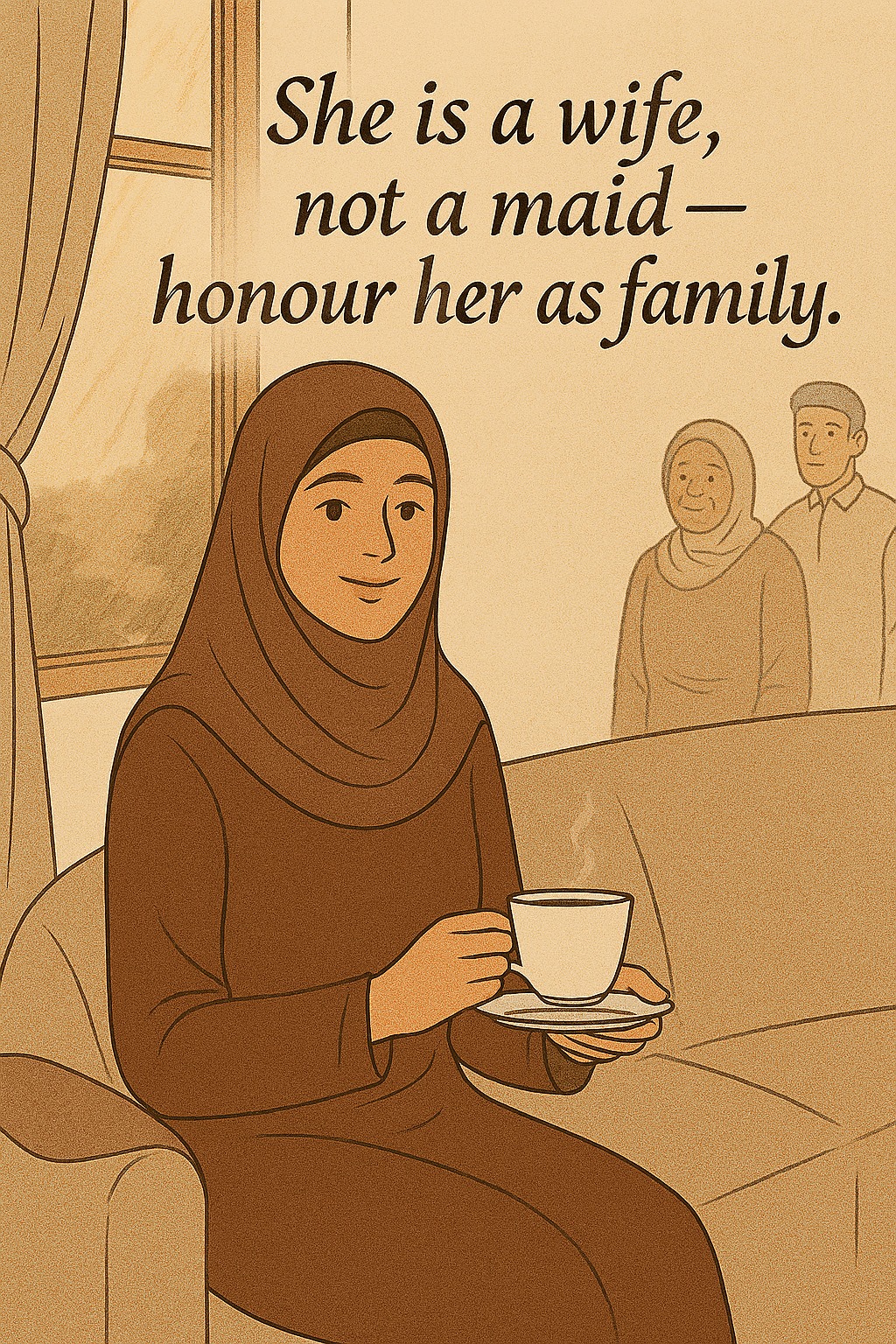The rights and dignity of daughters in law in Islam
A daughter-in-law is not a doormat
Islam is not just a set of beliefs but a way of life. It is religion in which we are encouraged to help and serve others. However, it is not a religion in which we accept being exploited. Unfortunately, there are cultural practices which oppress daughters-in-law that have no place in Islam.
A daughter-in-law’s parents will always be her parents
There is a widespread cultural misunderstanding in some communities that once a woman marries, her in-laws replace her own parents – this notion is both un-Islamic and unjust. A woman’s bond with her parents remains sacred and lifelong; marriage does not cancel the Qur’anic command to honour them.
Allah says: “And We have enjoined upon man [care] for his parents. His mother carried him, [increasing her] in weakness upon weakness, and his weaning is in two years. Be grateful to Me and to your parents; to Me is the [final] destination.” (Surah Luqman, 31:14).
Her in-laws are the parents of her husband and, as such, deserve kindness, dignity, and good treatment. In a healthy family, there is mutual love and respect, especially as she is raising the grandchildren of her husband’s parents. But it is wrong, both culturally and religiously, for in-laws to pressure her to sever or neglect her relationship with her own family. This is a violation of her rights and the natural ties Allah has commanded to uphold.
Unjust expectations of daughter-in-laws
Another common societal misconception, is that the daughter-in-law has arrived to serve her husband’s family. From cooking, cleaning and caring for aging elderly parents, to feeding and waiting on and serving extended family members as well.
In Islam, a daughter-in-law is a dignified woman, not a domestic worker for her husband’s extended family. Any cultural practice that expects or pressures a wife to serve her in-laws, is not from the teachings of the Shari’ah and, in many cases, and can constitute a form of oppression (dhulm). Islam affirms that a wife’s responsibility is primarily to her husband and children, not to her husband’s parents, siblings, or wider household, unless she willingly chooses to help.
The Prophet ﷺ said:
“Beware of oppression, for oppression will be darkness on the Day of Judgment.”
(Sahih Muslim)
Allah commands husbands in Surah al-Nisā’: “And live with them honourably (with kindness and fairness)” (Surah Nisa 4:19). This general principle of kindness applies not only from the husband to the wife, but to how she is treated by his family. Coercing her into unpaid and unrecognised service undermines this honourable treatment.
It is not permissible to:
- Force the wife to serve the husband’s parents or siblings against her will.
- Burden her with chores for the entire household under the excuse of being the “son’s wife.”
- Shame or pressure her if she refuses to serve them.
These actions fall constitute oppression and violate her dignity as a person. Classical scholars across the schools of thought supported this view. Imam Ibn Qudāmah of the Ḥanbalī school stated that a wife is not required to serve even her husband unless it is customary and not burdensome (Al Mughni). Imam al-Nawawī, a leading Shāfiʿī authority, was clear in his position: a husband has no right to oblige his wife to serve his parents or anyone else in his family (Rawḍat al-Ṭālibīn). Ibn Taymiyyah echoed the same, saying such acts, if done, are out of kindness, not obligation.
This means that any expectation for a wife to serve her in-laws must never be imposed. If she does so out of goodwill, this is regarded as iḥsān (excellence in character) and a way to uphold family ties. But the moment this becomes enforced or guilt-driven, it transitions from virtue to injustice.
Unfortunately, in many South Asian and Middle Eastern households, the daughter-in-law is burdened with household responsibilities for the in-laws, often under the label of “respect.” While Islam does encourage respect for elders, respect cannot be conflated with servitude. The Prophet ﷺ warned us: “Beware of oppression, for oppression will be darkness on the Day of Judgement.” (Sahih Muslim). Forcing or emotionally manipulating a daughter-in-law into service can constitute a hidden form of family abuse, which Islam clearly condemns.
Therefore, a wife who respectfully declines to serve her in-laws is not sinful or disobedient. She is within her full Islamic rights, and her refusal must not be met with criticism, blame, or emotional retaliation. In turn, she should uphold kindness, avoid confrontation, and foster goodwill with her in-laws where possible—but without compromising her dignity or overstretching her boundaries.
Respecting elders, honouring in-laws
While Islam does not obligate a wife to serve her in-laws, it does encourage kindness, respect, and good character towards all people, especially those connected through family ties. A wife should strive to treat her husband’s parents with honour and dignity, as part of embodying excellent manners and Islamic adab. These are the people who raised her husband and hold a special place in his life, and showing them warmth and respect can strengthen the marital bond and foster family harmony. The Prophet ﷺ said,
“The most beloved of people to Allah is the one who is most beneficial to others” (al-Mu‘jam al-Awsaṭ)
Therefore, even if she is not required to serve, she is rewarded for her voluntary acts of care and gentleness. Balancing her own rights with gracious conduct toward in-laws reflects the high moral standard Islam sets for believers in all relationships.
See more related posts
The ruling on forced marriages in Islam
The Muslim Guide to getting married
Saving a marriage that is breaking down
Do not mistake staying in a bad marriage for sabr
7 tips on how to make your marriage work

